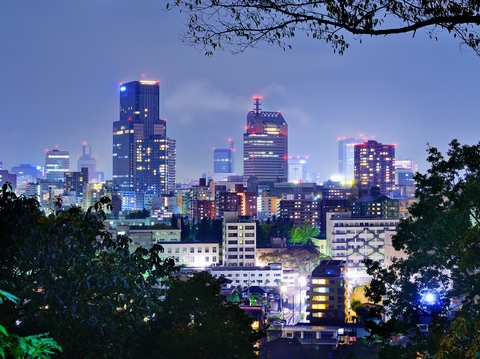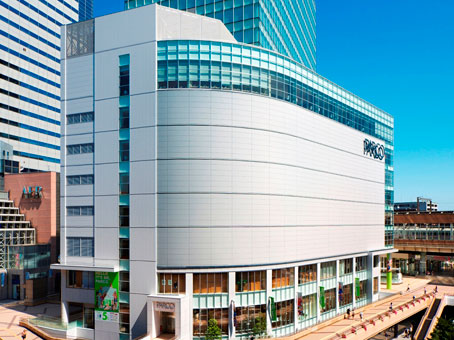
[Updated Oct 2020] A guide to serviced offices and office space to rent in Sendai as well as general information that may be useful if you are considering renting office space in the city.
For further Sendai offices information or to search office space to rent in Sendai just click. Or contact us for any office space search query.
History & Geography
As one of the largest cities in Japan, Sendai is a centre of local culture as well as being an economic hub of the Tohoku Region. The city is located on the north-east coast of Honshu, the largest of the islands that make up Japan. Sendai stretches from the Ou Mountains down to the Pacific Ocean and along the banks of the Hirose River. Sendai is known as a hilly city, with many of its hills in fact dormant volcanoes. The city of Sendai was established in 1600 by the daimyo Date Masamune when he needed a new strategic base from which to wage his campaigns. The daimyo constructed Sendai Castle and soon a sizable community grew up around it. By 1889, when it was incorporated as a city, Sendai was a bustling trading community and an important stop on the road to the capital Edo. The population of the city had swelled to 86,000 and it had an advanced infrastructure. City authorities encouraged residents to plant trees in their gardens and streets, as a result of which the city established a reputation as one of Japan’s greenest and became known as The City of Trees. When Sendai was bombed during WWII much of the greenery was unfortunately destroyed. During the war many American POWs were forced to work in Sendai’s lead mines. After the war, much of the damage caused by the bombing was rebuilt and the city prospered again. In the latter part of the 20th century, Sendai continued to grow, both by population and area. On March 11th 2011 a major earthquake struck Sendai and was followed by a sizable tsunami. Major damage was done and hundreds of residents of the city lost their lives. Sendai’s port also sustained major damage but has been rebuilt since. Sendai itself is still recovering from the tsunami, though much of the city is functioning normally again today.
Economy
Sendai is by no means one of Japan’s premier economic powerhouses, but it is certainly the economic centre of the Tohoku region. Sendai is particularly important in the areas of transportation and logistics. The city has been referred to as having ‘a branch office economy’ for the reason that it has no major industries based there and almost no company headquarters. One of the only company headquarters that does exist in the city is that of Tohoku Electric Power, the company that supplies electricity to the entire Tohoku region. Retail and services are bulwarks of Sendai’s economy and more than two-thirds of the jobs in the city are provided by these sectors. City authorities, aided by the national government have embarked on an effort to attract more industry to Sendai. This will be composed primarily of high-tech ventures. Sendai does have an advantage in cultivating such an industry because of the presence of Tohoku University, which is known for its strong engineering and science departments. The education sector is well represented in Sendai, which has Miyagi University, Tohoku University, and Tohoku Fukushi University.
Tourism & Culture
Sendai is not known as a major tourist destination in Japan, though it does have a reputation as one of the region’s most aesthetically pleasing cities with a unique culture of its own. Many visitors to the city walk down its two most famous streets, Jozenji-Dori, and Aoba-Dori, both lined with the famous Japanese zelkovas. Zelkovas are flowering trees specific to Sendai. The city is also known for celebrating the Tanabata festival, which annually sees almost two million visitors come to Sendai. Sendai also celebrates the Aoba Matsuri festival, which features a samurai parade and displays of traditional dancing. The city is also known for its speciality foods. The most famous of which is gyutan, grilled cow tongue. Robatayaki, which is a special kind of Japanese barbeque is also popular in Sendai. Most tourists visiting Sendai also take in the Sendai City Museum, which has a range of displays on Sendai’s storied history and the Date family that once ruled the city. Nature-lovers will want to take in the Akiu Great Falls, ranked as one of the three best waterfalls in Japan. Like many other Japanese cities, Sendai is also famous for its cherry blossoms in the spring.
Transport
Sendai is served by Sendai Airport which has international flights to several neighbouring countries. The airport is actually located in the city of Natori, next to Sendai, but is accessible by train and bus. Sendai is also served by the JR East Sendai Station which acts as the main transport centre of the city. Both the Tohoku and Akita Shinkansen lines serve the station. Sendai also has a single subway line, the Nanboku line, which runs north to south through the centre of the city. Another east-west line is currently under construction.

Renting Office Space in Sendai
Sendai’s office market is not especially dynamic considering the lack of company headquarters in the city. However, vacancy rates have fallen fairly significantly in the city of late. This is most likely from demand rising after the earthquake and ensuing tsunami. Businesses are now more interested in newer buildings which have more earthquake resistance. Sendai’s main office districts are Ekimae-Honcho, which is the largest, Kencho, Ichibancho, Eki-Higashi, and Izumichuo. Ekimae-Honcho is the most central of the districts and has a vacancy rate of approximately 18 percent. There are currently several large projects in the pipeline which will see new office space becoming available over the next several years.
Our office space search, advisory and acquisition services are FREE, always. We are globally regulated by the Royal Institution of Chartered Surveyors (RICS) ensuring the highest standards of commercial property advice and service at all times.
